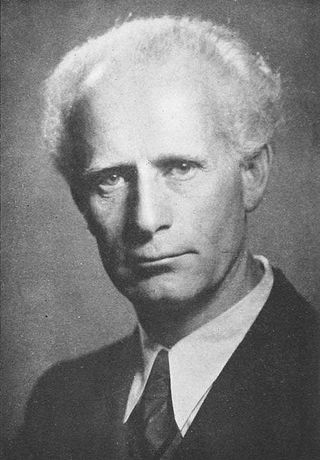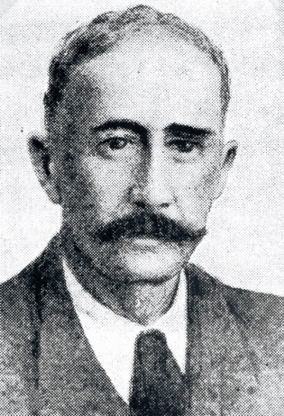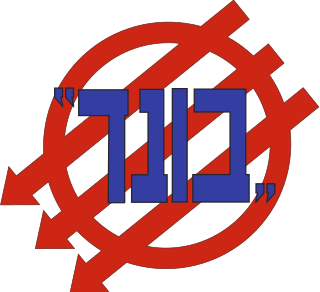Related Research Articles
A Yevsektsiya were the Jewish section of the Soviet Communist Party and its main institutions. These sections were established in fall of 1918 with consent of Vladimir Lenin to carry Party ideology and Marxist-Leninist atheism to the Soviet Jewish masses. The Yevsektsiya published a Yiddish periodical, der Emes. According to Walter Kolarz, the Yevsektsiya inside the League of Militant Godless, "had a total of 40,000 Jewish members in 1929, the year when the anti-religious campaign was at its peak. These 'Jewish sections' were much despised by the bulk of Russia's Jewry. Their members were regarded with as much contempt as the Jewish renegades who turned persecutors of the own brethren in the Middle Ages."

H. Leivick was a Yiddish language writer, known for his 1921 "dramatic poem in eight scenes" The Golem. He also wrote many highly political, realistic plays, including Shop. He adopted the pen name of Leivick to avoid being confused with Moyshe-Leyb Halpern, another prominent Yiddish poet.

OZET was the public Society for Settling Toiling Jews on the Land in the Soviet Union in the period from 1925 to 1938. Some English sources use the word "Working" instead of "Toiling".
Semyon (Shimen) Markovich Dimanshtein was a Soviet state official, publisher, and leading theorist of national issues in the USSR, and one of the founders of the Soviet Oriental studies. He was considered by the Soviet government to be a representative of Soviet Jews.
The accusation that Joseph Stalin was antisemitic is much discussed by historians. Although part of a movement that included Jews and rejected antisemitism, he privately displayed a contemptuous attitude toward Jews on various occasions that were witnessed by his contemporaries, and are documented by historical sources. Stalin argued that the Jews possessed a national character but were not a nation and were thus unassimilable. He argued that Jewish nationalism, particularly Zionism, was hostile to socialism. In 1939, he reversed communist policy and began a cooperation with Nazi Germany that included the removal of high-profile Jews from the Kremlin. As dictator of the Soviet Union, he promoted repressive policies that conspicuously impacted Jews shortly after World War II, especially during the anti-cosmopolitan campaign. At the time of his death, Stalin was planning an even larger campaign against Jews, which included the deportation of all Jews within the Soviet Union to Northern Kazakhstan. According to his successor Nikita Khrushchev, Stalin was fomenting the doctors' plot as a pretext for further anti-Jewish repressions.
The mass murders in Tykocin occurred on 25 August 1941, during World War II, where the local Jewish population of Tykocin (Poland) was killed by German Einsatzkommando.

Komunistishe fon, also known as Komfon, was a Soviet Yiddish newspaper published in Kiev 1919–1924. The newspaper was the result of the merger of two previously non-communist newspapers, Naye tsayt of the Fareynikte party and the Folkstsaytung of the Bund party. Kommunistishe fon was the organ of the Komfarband, and later became the organ of the Main Bureau of the Jewish sections of the Communist Party (bolshevik) of Ukraine.

The Organization for Jewish Colonization in Russia, commonly known by its transliterated acronym of ICOR, was a Communist-sponsored mass organization in North America devoted to supporting the settlement of Jews in new collective settlements, firstly in the newly established Ukrainian Soviet Republic and Southern Russia, and latterly in the Jewish Autonomous Oblast in Siberia. The organization was founded in the United States in 1924 and soon spread to Canada.

The Sotsyalistishe Kinder Farband or SKIF was founded in Eastern Europe as the youth organisation of the Jewish Labour Bund, a Jewish Socialist political party. S.K.I.F has three core ideological principles: Chavershaft, Doikayt, and Yiddishkeit. The plural form of a SKIF member is SKIFistn and the leaders who run SKIF are the Helfer, aged in their late teens to early twenties.

Leon Feiner was a Polish lawyer and activist. He was an activist of the General Jewish Labour Bund in Poland and between November 1944 and January 1945 the director (prezes) and vice-chairman of the Council to Aid Jews "Żegota".

The Jewish Communist Labour Bund, or the Kombund (קאמבונד), was a Jewish Communist political party in Ukraine, formed after a split in the General Jewish Labour Bund (Bund). Moisei Rafes and Aleksandr Chemerisky were the main leaders of the party.

The General Jewish Labour Bund in Poland was a Jewish socialist party in Poland which promoted the political, cultural and social autonomy of Jewish workers, sought to combat antisemitism and was generally opposed to Zionism.

The International Jewish Labor Bund (ILJB) was a New York-based international Jewish socialist organization, based on the legacy of the General Jewish Labour Bund founded in the Russian empire in 1897 and the Polish Bund that was active in the interwar years. The IJLB is composed by local Bundist groups around the world and was originally created to defend Jewish national-cultural rights in Eastern Europe. It was an "associated organization" of the Socialist International, similar in status to the World Labour Zionist Movement or the International League of Religious Socialists. Bundist ideology differed significantly from Zionist beliefs regarding the Yiddish language and the immigration of Jews. In the mid-2000s, The World Coordinating Committee of the Jewish Labor Bund was dissolved in New York, although local Bundist groups or groups inspired by the Jewish Labor Bund still exist in Mexico and Australia.

Bundism was a secular Jewish socialist movement whose first organizational manifestation was the General Jewish Labour Bund in Lithuania, Belarus, Poland, and Russia, founded in the Russian Empire in 1897.

The Jewish Socialist Workers Party, often nicknamed Seymists, was a Jewish socialist political party in the Russian Empire. The party was founded in April 1906, emerging out of the Vozrozhdenie (Renaissance) circles. The Vozrozhdenie was a non-Marxist tendency which was led by the nonmarxist thinker and politician Chaim Zhitlowsky. Zhitlowsky became the theoretician of the new party that advocated with the same emphasis Jewish self-reliance and socialism. Leaders of the party included Avrom Rozin (Ben-Adir), Nokhem Shtif, Moyshe Zilberfarb and Mark Ratner. The party was close to the Socialist-Revolutionary Party (PSR).

Poale Zion was a movement of Marxist–Zionist Jewish workers founded in various cities of Poland, Europe and the Russian Empire at about the turn of the 20th century after the Bund rejected Zionism in 1901.

The General Jewish Labour Bund in Lithuania, Poland and Russia, generally called The Bund or the Jewish Labour Bund, was a secular Jewish socialist party initially formed in the Russian Empire and active between 1897 and 1920. In 1917, the Bund organizations in Poland seceded from the Russian Bund and created a new Polish General Jewish Labour Bund which continued to operate in Poland in the years between the two world wars. The majority faction of the Russian Bund was dissolved in 1921 and incorporated into the Communist Party. Other remnants of the Bund endured in various countries. A member of the Bund was called a Bundist.

Aron Isaakovich Vainshtein, known by the nom de guerreRakhmiel, was a Jewish socialist activist and politician in Soviet Belorussia.

Jewish autonomy in Crimea was a project in the Soviet Union to create an autonomous region for Jews in the Crimean peninsula carried out during the 1920s and 1930s. Following WWII and the creation of the Jewish Autonomous Oblast in the Far East, the project was abandoned, despite the existence of more than 80 kolkhozes and an attempt to renew the project in 1944 by the Jewish Anti-Fascist Committee.

The Jewish Labour Bund, more commonly known as the Jewish Labour Bund Melbourne, the Australian Bund, or simply the Bund, is the Australian wing of the Bundist movement. It was a member of the historical International Jewish Labor Bund, and is the largest and most active Bundist organisation left in the world. It was founded in 1928 Jewish Polish immigrants, and expanded rapidly after the Second World War with the mass arrival of Holocaust survivors to Australia. The Bund is currently registered only in the state of Victoria, where it is legally known as the Jewish Labour Bund, Inc., and is based primarily in the city of Melbourne.
References
- 1 2 "Yiddish Newspapers and Journals". Australian Centre for Jewish Civilisation. Retrieved 2023-08-11.
- 1 2 3 4 5 6 7 8 9 10 11 Rechter, David (1991). "The Gezerd Down Under". In Frankel, Jonathan (ed.). Studies in Contemporary Jewry: Volume VII: Jews and Messianism in the Modern Era: Metaphor and Meaning. Contemporary Jewry . Institute of Contemporary Jewry, Hebrew University of Jerusalem. pp. 275–280. ISBN 978-0-19-536198-8.
- ↑ "Sender Burstin (1903-1986)". Australian Centre for Jewish Civilisation. Retrieved 2023-07-26.
- 1 2 3 Mendes, Philip (2009-02-19). "From Warsaw to Melbourne: Conflict between the Jewish Labour Bund and The Communists". Melbourne Jewish Museum– via Bund Archive.
- 1 2 3 4 Turnbull, Malcolm J (1999). Safe haven: Records of the Jewish experience in Australia (PDF) (2nd ed.). National Archives of Australia. pp. 122–123. ISBN 0-642-34413-2.
- ↑ ROZENSTEIN, CHAIM. YIDDISH THEATRE IN AUSTRALIA (PDF). Monash.
- ↑ "Jews Protest Against Pogroms". Workers' Weekly. 1933-04-14. Retrieved 2023-08-11.